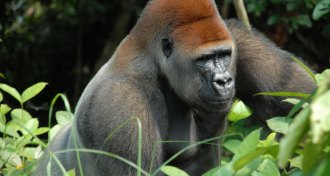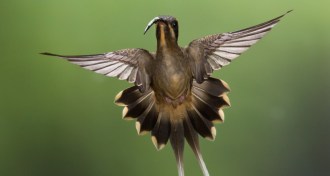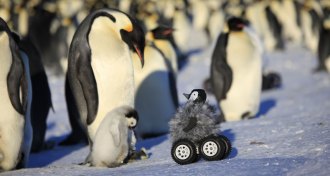Uncategorized
-
 Health & Medicine
Health & MedicineDengue vaccine offers partial protection
Shots reduce severe cases of dengue among children in large study in Latin America.
By Nathan Seppa -
 Health & Medicine
Health & MedicineIncrease in Denmark’s autism diagnoses caused by reporting changes
Changes in how autism is detected and recorded explain 60 percent of the recent increase in diagnoses, a Danish study finds.
-
 Cosmology
CosmologyGamma rays offer mixed messages on identity of dark matter
Conflicting results from Fermi telescope puzzle astronomers about dark matter’s true identity.
By Andrew Grant -
 Chemistry
ChemistryAtom breaks limit of lost electrons
An iridium atom sets the record for highest oxidation state at +9.
By Beth Mole -
 Life
LifeGut microbes less diverse in humans than in apes
An analysis of gut bacteria shows that humans have evolved to possess less diversity in microbe populations.
-
 Life
LifeHummingbirds take stab at rivals with dagger-tipped bills
Sharp points on the bills of male long-billed hermit hummingbirds may have evolved as weaponry.
By Susan Milius -
 Earth
EarthMore multi-tornado days in the forecast for U.S.
The number of days per year with tornadoes has gone down over the last few decades in the U.S., but the number of days that see 30 or more twisters is going up.
-
 Psychology
PsychologyMastering the art of self-control
Walter Mischel, the psychologist behind the marshmallow test, discusses his new book on self-control and willpower.
By Bruce Bower -
 Astronomy
AstronomyRendezvous with a comet
On November 12, Rosetta mission scientists successfully completed the first-ever attempt to put a lander on a comet. See all Science News coverage of Rosetta and Philae's voyage to comet 67P/Churyumov-Gerasimenko.
-
 Animals
AnimalsRemote-controlled rover doesn’t spook penguins
Remote-controlled rovers get close to skittish penguins without bothering them; a chick disguise wins over the wariest birds.
-
 Chemistry
ChemistryChemist tackles complex problems with simplicity
Harvard chemist George Whitesides applies his unique problem-solving philosophy to creating new diagnostic devices for the developing world.
By Sam Lemonick -
 Climate
ClimateMelting ice forces walrus detour
Warming temperatures and shrinking summer ice cover have forced the animals to seek solid ground during feeding season.